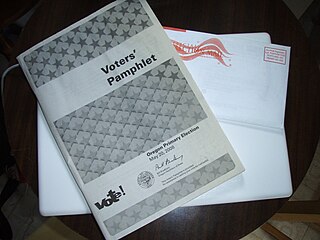Ballot Measure 36 of 1996 increased the U.S. state of Oregon's minimum wage from $4.75 to $6.50 over a three-year period. The measure was approved by voters in the 5 November 1996 general election, with 769,725 votes in favor and 584,303 votes against. [1] The measure was placed on the ballot as a result of initiative petition.

In the United States, a state is a constituent political entity, of which there are currently 50. Bound together in a political union, each state holds governmental jurisdiction over a separate and defined geographic territory and shares its sovereignty with the federal government. Due to this shared sovereignty, Americans are citizens both of the federal republic and of the state in which they reside. State citizenship and residency are flexible, and no government approval is required to move between states, except for persons restricted by certain types of court orders. Four states use the term commonwealth rather than state in their full official names.

Oregon is a state in the Pacific Northwest region on the West Coast of the United States. The Columbia River delineates much of Oregon's northern boundary with Washington, while the Snake River delineates much of its eastern boundary with Idaho. The parallel 42° north delineates the southern boundary with California and Nevada. Oregon is one of only three states of the contiguous United States to have a coastline on the Pacific Ocean.

A minimum wage is the lowest remuneration that employers can legally pay their workers—the price floor below which workers may not sell their labor. Most countries had introduced minimum wage legislation by the end of the 20th century.
Contents
Proponents of the measure included labor unions, the Oregon State Council of Senior Citizens and some religious groups. They argued that the previous minimum wage was not a living wage, and that many minimum wage earners were trying to support families – see family wage.

A living wage is the minimum income necessary for a worker to meet their basic needs. Needs are defined to include food, housing, and other essential needs such as clothing. The goal of a living wage is to allow a worker to afford a basic but decent standard of living. Due to the flexible nature of the term "needs", there is not one universally accepted measure of what a living wage is and as such it varies by location and household type.
A family wage is a wage that is sufficient to raise a family. This contrasts with a living wage, which is generally taken to mean a wage sufficient for a single individual to live on, but not necessarily sufficient to also support a family. As a stronger form of living wage, a family wage is likewise advocated by proponents of social justice. Family wage campaign was aiming to maintain the traditional family structure, as a concept connecting economics and family structure it is one of the examples of how economic structure of family, which is a subject of the field family economics, affects overall economy beyond the family.
Opponents included businesses that employ minimum wage earners, among others. They argued that increasing the minimum wage would increase consumer prices, and increase unemployment as employers would be able to hire fewer workers. They also pointed out that the U.S. Congress had just passed a (smaller) increase to the federal minimum wage.

Business is the activity of making one's living or making money by producing or buying and selling products. Simply put, it is "any activity or enterprise entered into for profit. It does not mean it is a company, a corporation, partnership, or have any such formal organization, but it can range from a street peddler to General Motors."

Unemployment or joblessness is a situation in which able-bodied people who are looking for a job cannot find a job.

The United States Congress is the bicameral legislature of the Federal Government of the United States. The legislature consists of two chambers: the House of Representatives and the Senate.
In 2002, voters passed Measure 25, which again increased the minimum wage. Measure 25 also tied future minimum wage increases to inflation.










